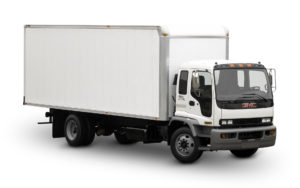Many times, we encounter customers that think they can use their vehicle in business and cover it with a personal auto policy. That is only sometimes true, depending on the particular type of business.
Differences between Personal and Business Auto Insurance
Some personal auto policies expressly exclude coverage for “business use” of vehicles. This might seem to be unfair from the standpoint that a car is a car and it shouldn’t matter why one is driving the car. However, again depending on the business, how you use that vehicle could make a big difference in the likelyhood that you will have an accident.
 Delivery
Delivery
Delivery drivers contend with multiple stops and tight schedules. This dramatically increases the odds of an accident and is clearly the job for a business auto policy.
Specialized Equipment
Vehicles that have specialized equipment, such as utility beds for tool storage, are more likely to be excluded from a personal auto policy.
Multiple Vehicles
Other concerns might be the number of vehicles in use by the business. If there are multiple vehicles a business auto policy may be a better choice. For businesses that have a lot of vehicles a business auto policy can be written on a blanket (All Autos) basis to simplify things.
 Incidental Uses
Incidental Uses
At the other end of the spectrum would be a real estate agent using their car to drive potential customers to see homes. This is also a business use however on some policies that would be acceptable as an “incidental business use”.
Cost
The cost of a business auto policy is not always as big a problem as people fear. Often times, we are surprised at how close the pricing of a business auto policy is to the personal auto policy it is replacing.
The best option is to discuss with us your particular business and how it uses vehicles and, if needed, have us provide a business auto quote to compare.

 Employees
Employees If you look at most of the advertisements for contracting services, the words “Licensed and Bonded” are frequently used. The intent is to give you, the consumer, a feeling of comfort. After all, if something does go wrong they are bonded, right? Not so! The bond that contractors have is called a Contractors License Bond. It allows the
If you look at most of the advertisements for contracting services, the words “Licensed and Bonded” are frequently used. The intent is to give you, the consumer, a feeling of comfort. After all, if something does go wrong they are bonded, right? Not so! The bond that contractors have is called a Contractors License Bond. It allows the  The California Department of Insurance recently released a statement regarding a program to check contractors for licensing, insurance and safety. Essentially, individual cars with employees from 4 different agencies (DOI, CSLB, EDD, OSHA) are checking job sites, including individual homeowners, to confirm that the contractors working there are licensed, have insurance, are filing their payroll taxes, and are conducting their work safely. On one day at the end of August, they issued over $136,000 in fines.
The California Department of Insurance recently released a statement regarding a program to check contractors for licensing, insurance and safety. Essentially, individual cars with employees from 4 different agencies (DOI, CSLB, EDD, OSHA) are checking job sites, including individual homeowners, to confirm that the contractors working there are licensed, have insurance, are filing their payroll taxes, and are conducting their work safely. On one day at the end of August, they issued over $136,000 in fines.